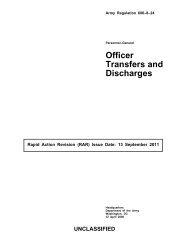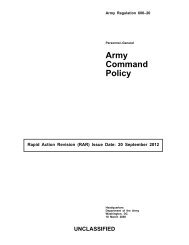Patient Administration - Army Publishing Directorate - U.S. Army
Patient Administration - Army Publishing Directorate - U.S. Army
Patient Administration - Army Publishing Directorate - U.S. Army
Create successful ePaper yourself
Turn your PDF publications into a flip-book with our unique Google optimized e-Paper software.
(6) Those involving ROTC members on a training tour (annual training camps and training encampments at military<br />
installations)—<br />
(a) Who may be eligible for benefits under the OWCP because of an injury incurred or a disease contracted during<br />
their training tour (para 5-9 and AR 145-1).<br />
(b) Who require hospitalization beyond the termination of their training tour.<br />
(7) Those involving mental competency.<br />
(8) Those involving persons scheduled for separation under AR 600-8-24 or AR 635-200 when it appears that a<br />
mental illness, medical condition, or physical defect is the direct cause of unfitness or unsuitability. Referral into the<br />
PDES takes precedence over enlisted administrative separations except where the regulatory provisions authorize a<br />
discharge characterized as Under Other Than Honorable Conditions. Officers pending administrative separations are<br />
generally dual processed.<br />
(9) Those involving persons who are being considered for expeditious discharge under AR 635-40. This also<br />
includes personnel who request waiver of the PEB evaluation for non-service aggravated, pre-existing conditions.<br />
(10) Those deemed necessary by the appointing authority.<br />
c. As required, the responsible MTF will use an MEB to determine mental competency of any military member who<br />
is hospitalized in a non-Federal facility. The Departments of the Navy, Air Force, and VA are authorized to determine<br />
mental competency of retired <strong>Army</strong> members when such persons are hospitalized in a facility under their jurisdiction.<br />
7–6. Sanity boards<br />
A sanity board consists of one or more medical officers and is convened according to Rule 706, Manual for Courts-<br />
Martial, 1995 edition (Misc Pub 27-7), to inquire into the mental condition of an accused. Findings of the sanity board<br />
concerning the person’s sanity, including specific answers to the questions posed in Rule 706, will be submitted in<br />
writing to the parties concerned. The members of the board will be furnished all facts and circumstances of the incident<br />
or occurrence that led to convening the sanity board. This will include a copy of the investigation conducted under<br />
UCMJ, Article 32. Officers serving on sanity boards may be physicians (preferably psychiatrists) or licensed clinical<br />
psychologists. At least one member must be a psychiatrist or a clinical psychologist. Licensed psychologists are<br />
included on sanity boards so that they can provide appropriate tests and evaluations-different from psychiatric<br />
evaluations-to determine the mental competency or responsibility of the accused. The selection of officers to be<br />
appointed to a sanity board is the responsibility of the MTF commander who should decide, based on the individual<br />
case and on the differences between psychiatric and psychological examinations, which of the two disciplines (if not<br />
both) should be represented on the sanity board.<br />
7–7. Medical evaluation board proceedings<br />
MEBs operate informally and may assemble to discuss and evaluate the patient’s case. Clinical, health, and other<br />
records, as appropriate, are reviewed. If deemed appropriate and when a patient’s condition permits, the patient may be<br />
given the opportunity to appear in person and present their views relative to the proposed disposition. Medical fitness<br />
standards are contained in AR 40-501 for military members and for ROTC members.<br />
7–8. Recording proceedings<br />
a. MEB proceedings will be recorded on DA Form 3947 (Medical Evaluation Board Proceedings). DA Form 3947 is<br />
available on the APD Web site (www.apd.army.mil). The following general instructions apply in the completion of DA<br />
Form 3947: A brief, but complete, clinical history prepared by the patient’s attending physician on SF 502 will be<br />
attached to the board proceedings as enclosure 1. This will include a summary of available prior medical records and<br />
information from the HREC and the DD Form 2808 prepared at the time of entry into Service.<br />
(1) For patients with a mental disorder, regardless of etiology, include a statement indicating whether the patient<br />
is—<br />
(a) Mentally competent for pay purposes.<br />
(b) Capable of understanding the nature of, and cooperating in, PEB proceedings.<br />
(c) Dangerous to himself, herself, or others.<br />
(2) For psychiatric illnesses considered to have begun or existed at the time of entry into the Service, include in the<br />
narrative summary all available clinical and social data concerning the conditions of the patient’s entry into Service.<br />
The summary should also show significant behavior and the patient’s attitude toward the <strong>Army</strong> and toward the act of<br />
entry into Service. It should also include data upon which to base a judgment on whether or not the patient was<br />
mentally competent to understand the nature of the act of entry into Service. If the patient is considered to have been<br />
incompetent to understand the act of entry into Service, then the clinical data should show the subsequent date when<br />
the patient did become competent to understand the nature of this act. If the patient never became so competent,<br />
clinical data should be sufficient to support this opinion.<br />
(3) When an EPTS condition is judged to be aggravated by service, the severity and circumstances will be clearly<br />
indicated in the narrative summary.<br />
54 AR 40–400 27 January 2010/RAR 15 September 2011
















